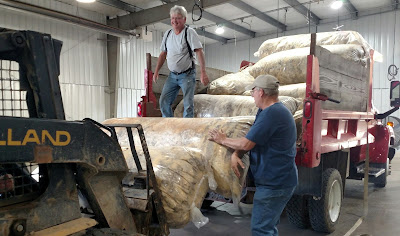 |
2018 Wool Pool
Washington County Sheep & Wool Growers Association
Stomping Fleeces Into A Wool Sack!
|
We packed up all of our uncommitted wool fleeces and took them to the wool pool at the Washington County Fairgrounds last week. Generally speaking, "wool pools" are the farmers' outlet for their wool. Wool pools solicit bids on their anticipated wool "clip". The winning bidder is chosen as the one whose overall prices and terms are most favorable to the association. Bids are based on current domestic & global demand for the various grades of wool, as well as what the bidder expects to get from each pool based on the recent history of the pool. Fleeces sold through the wool pools are considered a commodity product.
This wool is dropped into breathable plastic wool sacks and stomped down to pack it tightly! As the shearing is being done, once the wool gets high enough, usually a kid or young adult steps in and stomps the wool. Pack, stomp, repeat until full, and sew or tie the bag shut!
 |
| Unloading Wool Sacks & Adding Producers' Lot Number For Tracking |
Each wool sack is logged in and a lot number is assigned on each producers' receipt. The wool sacks (or 3 mil plastic contractor trash bags for those with fewer fleeces) are then loaded onto the waiting semi truck …
 |
| Skid Steer Loads 2 Sacks At A Time … |
 |
| Mid-States Wool Growers Co-op Manager Oversees Loading Semi-Trailer |
The wool will be weighed and graded at the buyers' facility. The producers will be paid by checks based on the quoted $/pound by grade agreed to on the bid. Many pools have gone to selling their clips "ungraded" because of the difficulty in finding wool classers or wool graders to man the pools on drop off days.
Keep in mind that the prices for commodity wool are much different from those that specialty wool growers get for our "curated" fleeces! In fact, most of the long luster wools, double coated wools, and natural colored wools are severely docked in price at the wool pool. Jacketing sheep and selling pristine heavily skirted spinning fleeces is an entirely different market!
Examples from the 2018 Bid:
Fine Staple wool, aka Merino, Rambouillet, Columbia bid price $1.70/pound
Medium or 3/8 & 1/4 Staple wool, aka Dorset, Suffolk, Cheviot, Texel bid price $.46/pound
Fine & 1/2 Clothing wool, aka fine wool sheep crossbreds bid price $.80/pound
Natural Colored wool, aka anything but white bid price $.02/pound (yes, 2 cents per pound!)
Heavy Vegetable Matter bid price $.12/pound.
That's your sheep wool economics lesson for the year … whew.
Keep in mind that not every fleece is a show fleece or a high quality hand spinner fleece … many specialty wool producers process their wool into yarn, top, roving, batts, etc. to maximize our wool marketing!




